The Role of Interpersonal Communication Skills in the ICT Field
VerifiedAdded on 2021/05/31
|7
|2012
|45
Essay
AI Summary
This essay explores the critical role of interpersonal communication skills in the Information Communication and Technology (ICT) field. It emphasizes that successful ICT professionals need to effectively relate with clients, colleagues, and superiors. The essay focuses on three key skills: listening, feedback, and questioning, detailing their significance in the context of software development, client interactions, and overall career success. The essay highlights the importance of active listening, providing timely and constructive feedback, and asking insightful questions to ensure clear communication and project success. It also discusses the barriers to effective communication and underscores the impact of these skills on an individual's professional development and ability to thrive in the ICT industry. The essay draws on various sources to support its arguments, demonstrating the value of strong interpersonal communication in the dynamic field of ICT. Students can find similar assignments and solutions on Desklib, an AI-powered platform for study resources.
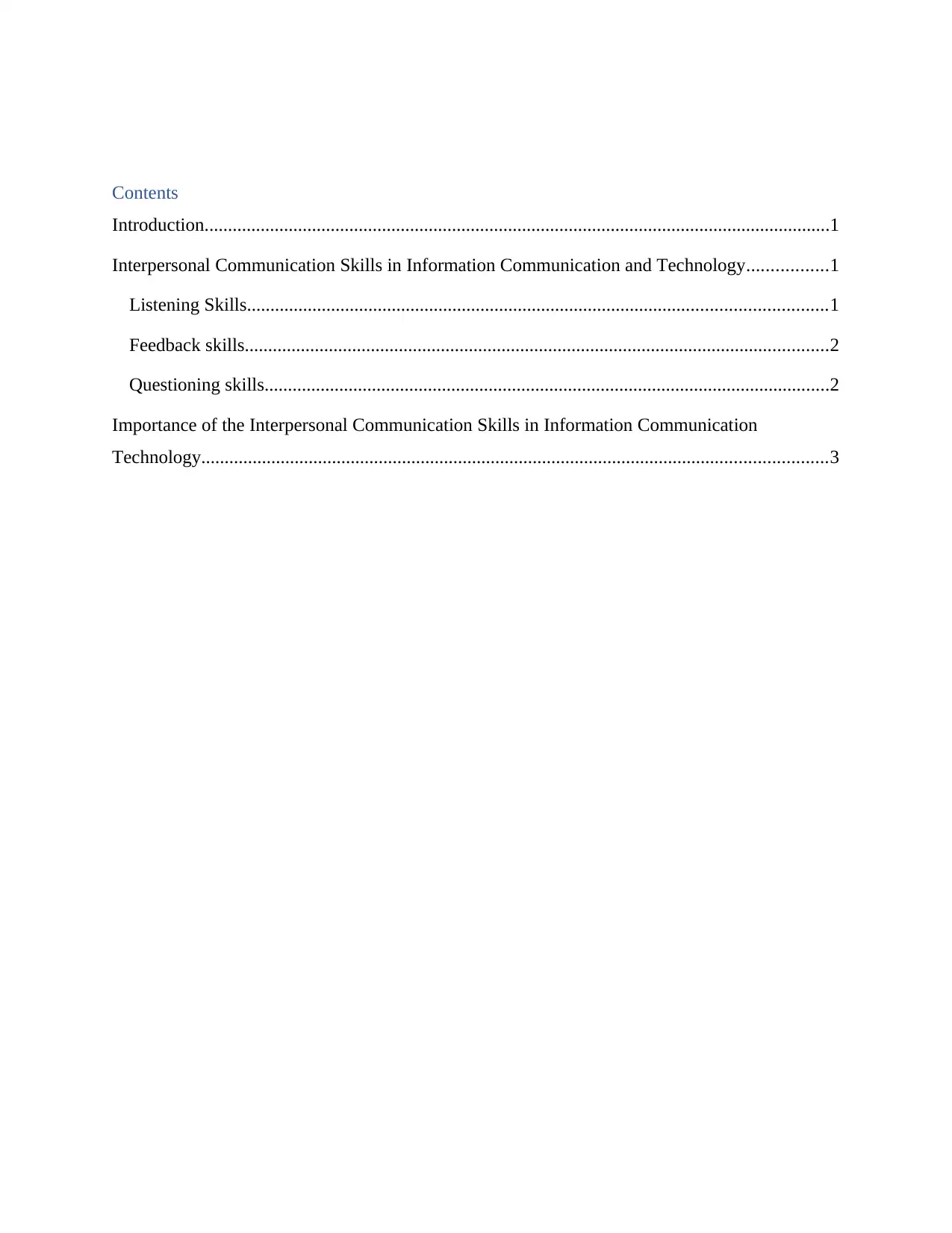
Contents
Introduction......................................................................................................................................1
Interpersonal Communication Skills in Information Communication and Technology.................1
Listening Skills............................................................................................................................1
Feedback skills.............................................................................................................................2
Questioning skills.........................................................................................................................2
Importance of the Interpersonal Communication Skills in Information Communication
Technology......................................................................................................................................3
Introduction......................................................................................................................................1
Interpersonal Communication Skills in Information Communication and Technology.................1
Listening Skills............................................................................................................................1
Feedback skills.............................................................................................................................2
Questioning skills.........................................................................................................................2
Importance of the Interpersonal Communication Skills in Information Communication
Technology......................................................................................................................................3
Paraphrase This Document
Need a fresh take? Get an instant paraphrase of this document with our AI Paraphraser

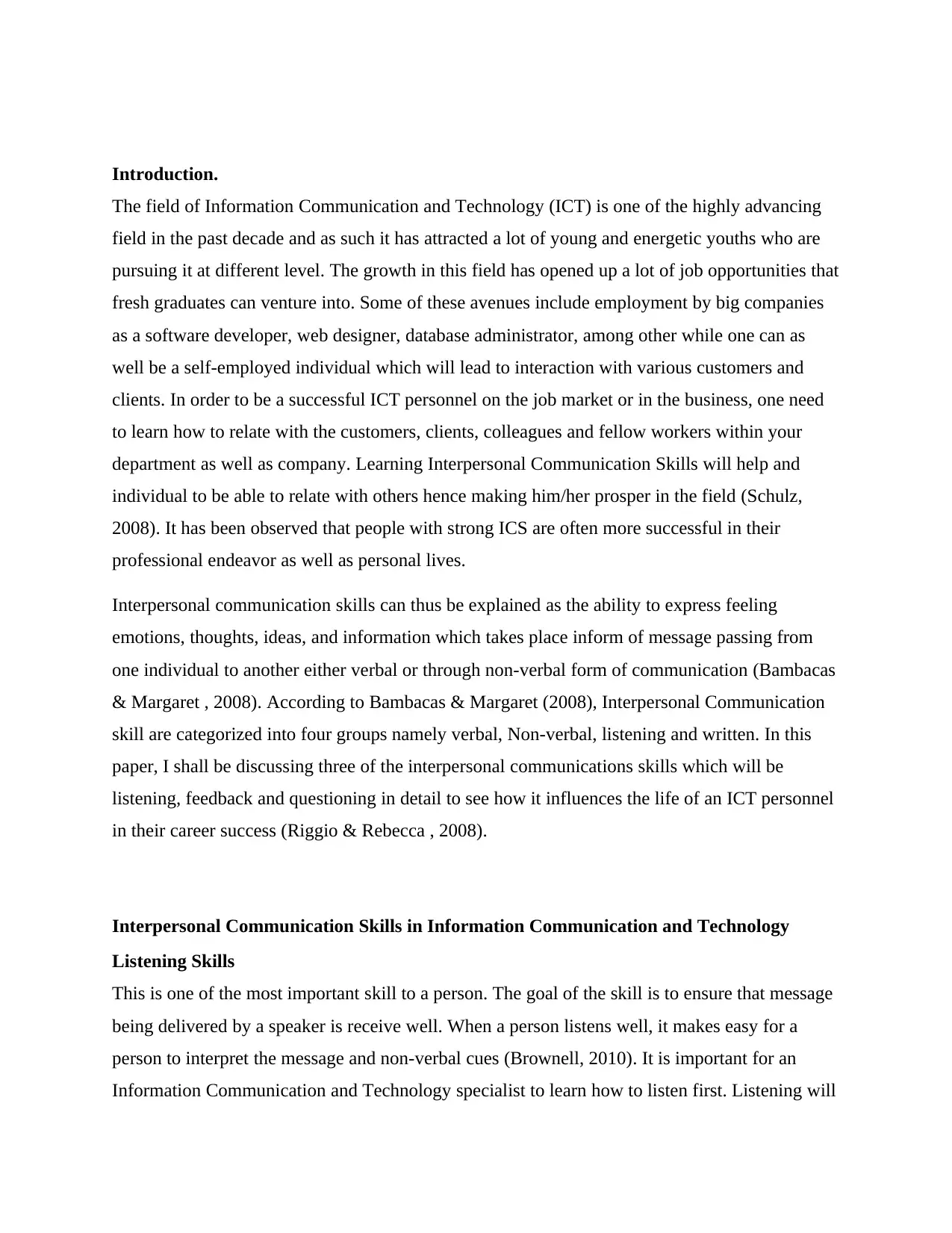
Introduction.
The field of Information Communication and Technology (ICT) is one of the highly advancing
field in the past decade and as such it has attracted a lot of young and energetic youths who are
pursuing it at different level. The growth in this field has opened up a lot of job opportunities that
fresh graduates can venture into. Some of these avenues include employment by big companies
as a software developer, web designer, database administrator, among other while one can as
well be a self-employed individual which will lead to interaction with various customers and
clients. In order to be a successful ICT personnel on the job market or in the business, one need
to learn how to relate with the customers, clients, colleagues and fellow workers within your
department as well as company. Learning Interpersonal Communication Skills will help and
individual to be able to relate with others hence making him/her prosper in the field (Schulz,
2008). It has been observed that people with strong ICS are often more successful in their
professional endeavor as well as personal lives.
Interpersonal communication skills can thus be explained as the ability to express feeling
emotions, thoughts, ideas, and information which takes place inform of message passing from
one individual to another either verbal or through non-verbal form of communication (Bambacas
& Margaret , 2008). According to Bambacas & Margaret (2008), Interpersonal Communication
skill are categorized into four groups namely verbal, Non-verbal, listening and written. In this
paper, I shall be discussing three of the interpersonal communications skills which will be
listening, feedback and questioning in detail to see how it influences the life of an ICT personnel
in their career success (Riggio & Rebecca , 2008).
Interpersonal Communication Skills in Information Communication and Technology
Listening Skills
This is one of the most important skill to a person. The goal of the skill is to ensure that message
being delivered by a speaker is receive well. When a person listens well, it makes easy for a
person to interpret the message and non-verbal cues (Brownell, 2010). It is important for an
Information Communication and Technology specialist to learn how to listen first. Listening will
The field of Information Communication and Technology (ICT) is one of the highly advancing
field in the past decade and as such it has attracted a lot of young and energetic youths who are
pursuing it at different level. The growth in this field has opened up a lot of job opportunities that
fresh graduates can venture into. Some of these avenues include employment by big companies
as a software developer, web designer, database administrator, among other while one can as
well be a self-employed individual which will lead to interaction with various customers and
clients. In order to be a successful ICT personnel on the job market or in the business, one need
to learn how to relate with the customers, clients, colleagues and fellow workers within your
department as well as company. Learning Interpersonal Communication Skills will help and
individual to be able to relate with others hence making him/her prosper in the field (Schulz,
2008). It has been observed that people with strong ICS are often more successful in their
professional endeavor as well as personal lives.
Interpersonal communication skills can thus be explained as the ability to express feeling
emotions, thoughts, ideas, and information which takes place inform of message passing from
one individual to another either verbal or through non-verbal form of communication (Bambacas
& Margaret , 2008). According to Bambacas & Margaret (2008), Interpersonal Communication
skill are categorized into four groups namely verbal, Non-verbal, listening and written. In this
paper, I shall be discussing three of the interpersonal communications skills which will be
listening, feedback and questioning in detail to see how it influences the life of an ICT personnel
in their career success (Riggio & Rebecca , 2008).
Interpersonal Communication Skills in Information Communication and Technology
Listening Skills
This is one of the most important skill to a person. The goal of the skill is to ensure that message
being delivered by a speaker is receive well. When a person listens well, it makes easy for a
person to interpret the message and non-verbal cues (Brownell, 2010). It is important for an
Information Communication and Technology specialist to learn how to listen first. Listening will
⊘ This is a preview!⊘
Do you want full access?
Subscribe today to unlock all pages.

Trusted by 1+ million students worldwide
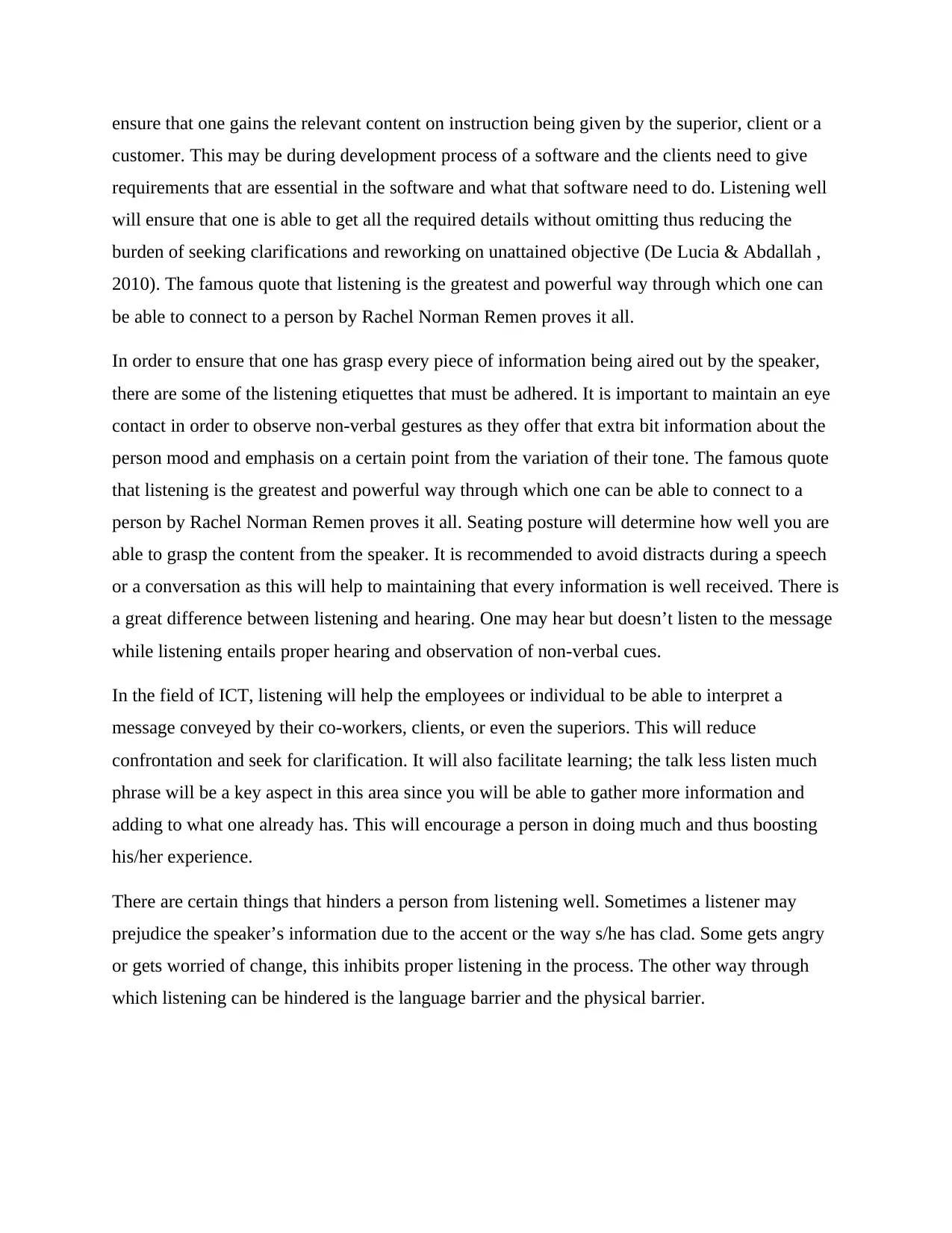
ensure that one gains the relevant content on instruction being given by the superior, client or a
customer. This may be during development process of a software and the clients need to give
requirements that are essential in the software and what that software need to do. Listening well
will ensure that one is able to get all the required details without omitting thus reducing the
burden of seeking clarifications and reworking on unattained objective (De Lucia & Abdallah ,
2010). The famous quote that listening is the greatest and powerful way through which one can
be able to connect to a person by Rachel Norman Remen proves it all.
In order to ensure that one has grasp every piece of information being aired out by the speaker,
there are some of the listening etiquettes that must be adhered. It is important to maintain an eye
contact in order to observe non-verbal gestures as they offer that extra bit information about the
person mood and emphasis on a certain point from the variation of their tone. The famous quote
that listening is the greatest and powerful way through which one can be able to connect to a
person by Rachel Norman Remen proves it all. Seating posture will determine how well you are
able to grasp the content from the speaker. It is recommended to avoid distracts during a speech
or a conversation as this will help to maintaining that every information is well received. There is
a great difference between listening and hearing. One may hear but doesn’t listen to the message
while listening entails proper hearing and observation of non-verbal cues.
In the field of ICT, listening will help the employees or individual to be able to interpret a
message conveyed by their co-workers, clients, or even the superiors. This will reduce
confrontation and seek for clarification. It will also facilitate learning; the talk less listen much
phrase will be a key aspect in this area since you will be able to gather more information and
adding to what one already has. This will encourage a person in doing much and thus boosting
his/her experience.
There are certain things that hinders a person from listening well. Sometimes a listener may
prejudice the speaker’s information due to the accent or the way s/he has clad. Some gets angry
or gets worried of change, this inhibits proper listening in the process. The other way through
which listening can be hindered is the language barrier and the physical barrier.
customer. This may be during development process of a software and the clients need to give
requirements that are essential in the software and what that software need to do. Listening well
will ensure that one is able to get all the required details without omitting thus reducing the
burden of seeking clarifications and reworking on unattained objective (De Lucia & Abdallah ,
2010). The famous quote that listening is the greatest and powerful way through which one can
be able to connect to a person by Rachel Norman Remen proves it all.
In order to ensure that one has grasp every piece of information being aired out by the speaker,
there are some of the listening etiquettes that must be adhered. It is important to maintain an eye
contact in order to observe non-verbal gestures as they offer that extra bit information about the
person mood and emphasis on a certain point from the variation of their tone. The famous quote
that listening is the greatest and powerful way through which one can be able to connect to a
person by Rachel Norman Remen proves it all. Seating posture will determine how well you are
able to grasp the content from the speaker. It is recommended to avoid distracts during a speech
or a conversation as this will help to maintaining that every information is well received. There is
a great difference between listening and hearing. One may hear but doesn’t listen to the message
while listening entails proper hearing and observation of non-verbal cues.
In the field of ICT, listening will help the employees or individual to be able to interpret a
message conveyed by their co-workers, clients, or even the superiors. This will reduce
confrontation and seek for clarification. It will also facilitate learning; the talk less listen much
phrase will be a key aspect in this area since you will be able to gather more information and
adding to what one already has. This will encourage a person in doing much and thus boosting
his/her experience.
There are certain things that hinders a person from listening well. Sometimes a listener may
prejudice the speaker’s information due to the accent or the way s/he has clad. Some gets angry
or gets worried of change, this inhibits proper listening in the process. The other way through
which listening can be hindered is the language barrier and the physical barrier.
Paraphrase This Document
Need a fresh take? Get an instant paraphrase of this document with our AI Paraphraser
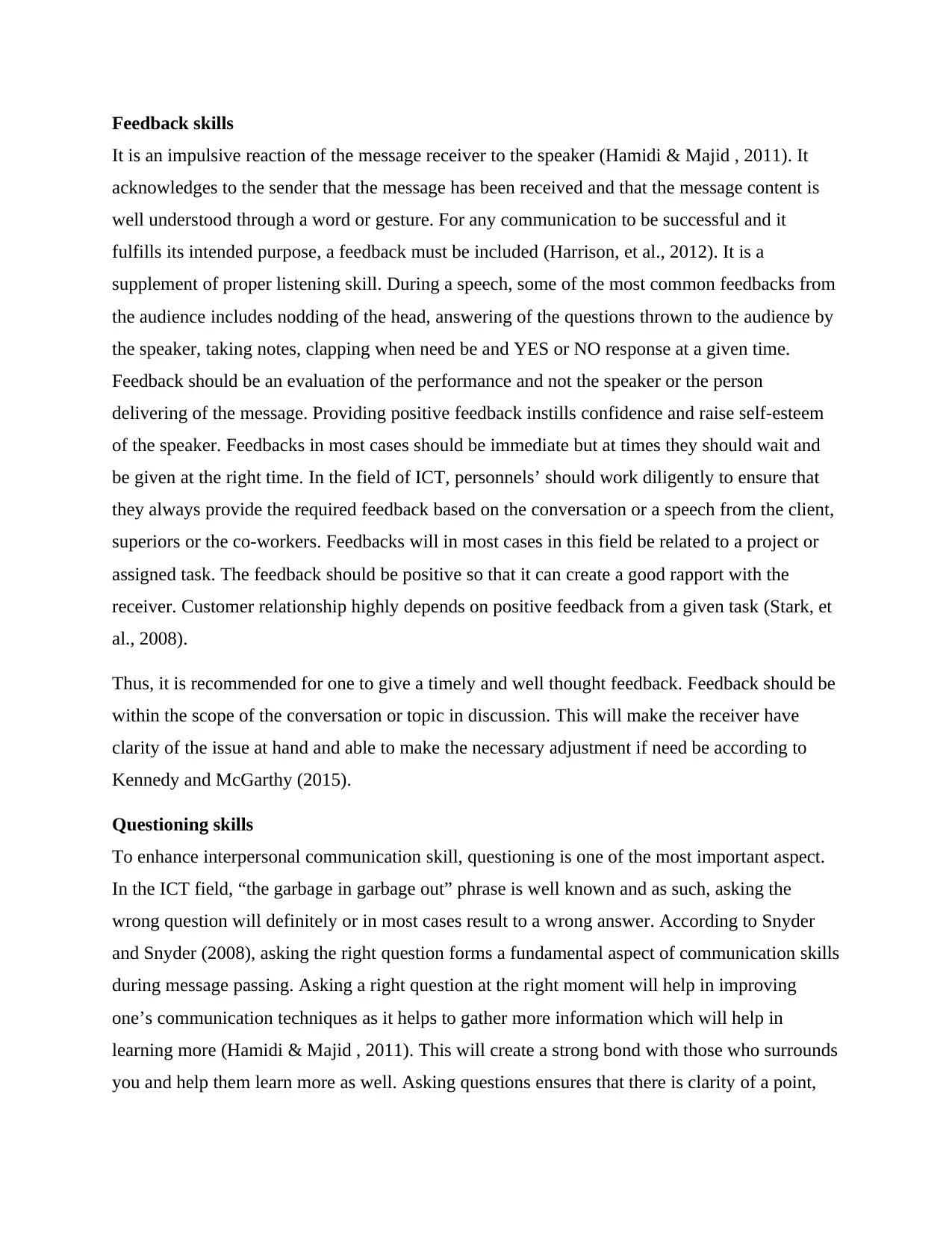
Feedback skills
It is an impulsive reaction of the message receiver to the speaker (Hamidi & Majid , 2011). It
acknowledges to the sender that the message has been received and that the message content is
well understood through a word or gesture. For any communication to be successful and it
fulfills its intended purpose, a feedback must be included (Harrison, et al., 2012). It is a
supplement of proper listening skill. During a speech, some of the most common feedbacks from
the audience includes nodding of the head, answering of the questions thrown to the audience by
the speaker, taking notes, clapping when need be and YES or NO response at a given time.
Feedback should be an evaluation of the performance and not the speaker or the person
delivering of the message. Providing positive feedback instills confidence and raise self-esteem
of the speaker. Feedbacks in most cases should be immediate but at times they should wait and
be given at the right time. In the field of ICT, personnels’ should work diligently to ensure that
they always provide the required feedback based on the conversation or a speech from the client,
superiors or the co-workers. Feedbacks will in most cases in this field be related to a project or
assigned task. The feedback should be positive so that it can create a good rapport with the
receiver. Customer relationship highly depends on positive feedback from a given task (Stark, et
al., 2008).
Thus, it is recommended for one to give a timely and well thought feedback. Feedback should be
within the scope of the conversation or topic in discussion. This will make the receiver have
clarity of the issue at hand and able to make the necessary adjustment if need be according to
Kennedy and McGarthy (2015).
Questioning skills
To enhance interpersonal communication skill, questioning is one of the most important aspect.
In the ICT field, “the garbage in garbage out” phrase is well known and as such, asking the
wrong question will definitely or in most cases result to a wrong answer. According to Snyder
and Snyder (2008), asking the right question forms a fundamental aspect of communication skills
during message passing. Asking a right question at the right moment will help in improving
one’s communication techniques as it helps to gather more information which will help in
learning more (Hamidi & Majid , 2011). This will create a strong bond with those who surrounds
you and help them learn more as well. Asking questions ensures that there is clarity of a point,
It is an impulsive reaction of the message receiver to the speaker (Hamidi & Majid , 2011). It
acknowledges to the sender that the message has been received and that the message content is
well understood through a word or gesture. For any communication to be successful and it
fulfills its intended purpose, a feedback must be included (Harrison, et al., 2012). It is a
supplement of proper listening skill. During a speech, some of the most common feedbacks from
the audience includes nodding of the head, answering of the questions thrown to the audience by
the speaker, taking notes, clapping when need be and YES or NO response at a given time.
Feedback should be an evaluation of the performance and not the speaker or the person
delivering of the message. Providing positive feedback instills confidence and raise self-esteem
of the speaker. Feedbacks in most cases should be immediate but at times they should wait and
be given at the right time. In the field of ICT, personnels’ should work diligently to ensure that
they always provide the required feedback based on the conversation or a speech from the client,
superiors or the co-workers. Feedbacks will in most cases in this field be related to a project or
assigned task. The feedback should be positive so that it can create a good rapport with the
receiver. Customer relationship highly depends on positive feedback from a given task (Stark, et
al., 2008).
Thus, it is recommended for one to give a timely and well thought feedback. Feedback should be
within the scope of the conversation or topic in discussion. This will make the receiver have
clarity of the issue at hand and able to make the necessary adjustment if need be according to
Kennedy and McGarthy (2015).
Questioning skills
To enhance interpersonal communication skill, questioning is one of the most important aspect.
In the ICT field, “the garbage in garbage out” phrase is well known and as such, asking the
wrong question will definitely or in most cases result to a wrong answer. According to Snyder
and Snyder (2008), asking the right question forms a fundamental aspect of communication skills
during message passing. Asking a right question at the right moment will help in improving
one’s communication techniques as it helps to gather more information which will help in
learning more (Hamidi & Majid , 2011). This will create a strong bond with those who surrounds
you and help them learn more as well. Asking questions ensures that there is clarity of a point,
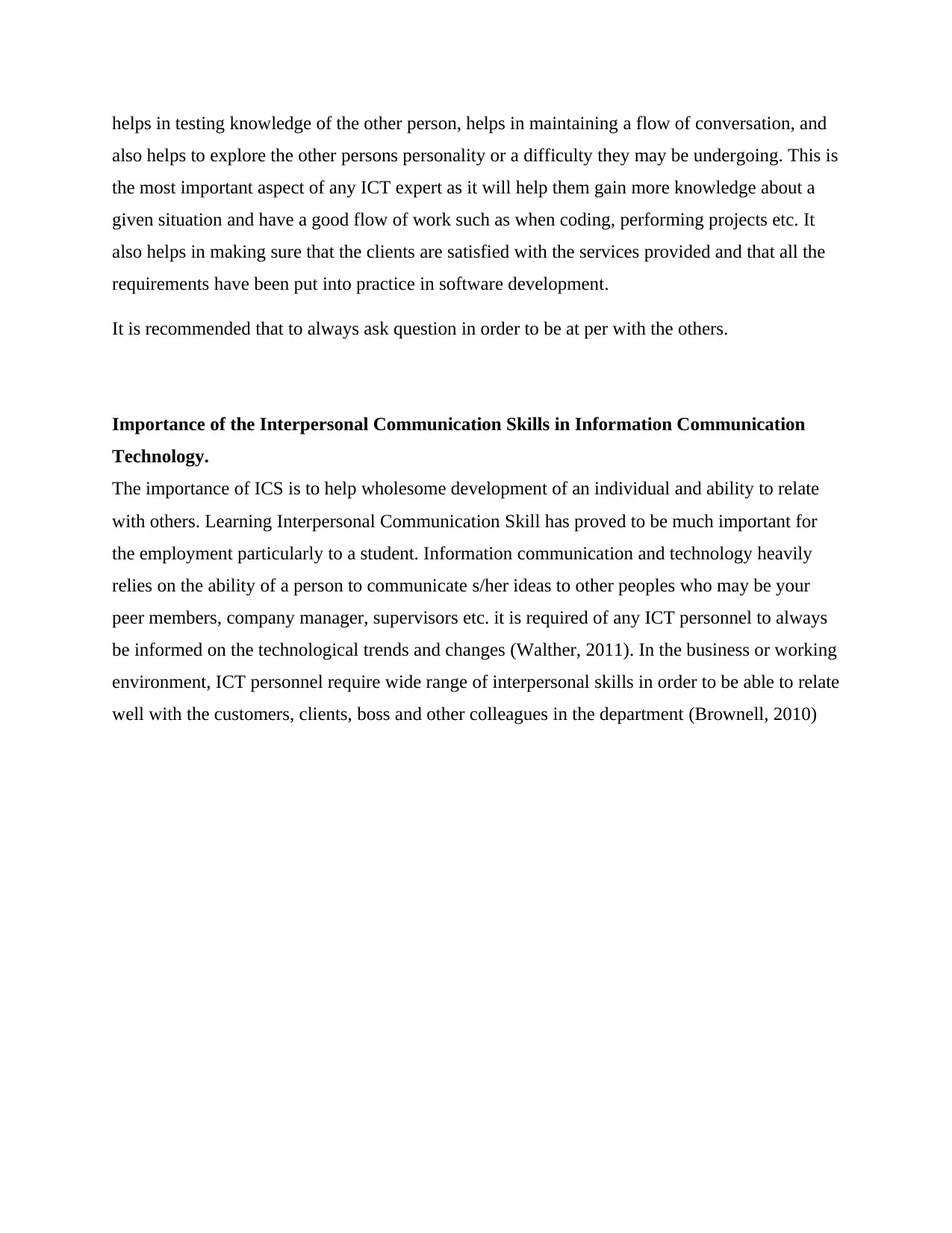
helps in testing knowledge of the other person, helps in maintaining a flow of conversation, and
also helps to explore the other persons personality or a difficulty they may be undergoing. This is
the most important aspect of any ICT expert as it will help them gain more knowledge about a
given situation and have a good flow of work such as when coding, performing projects etc. It
also helps in making sure that the clients are satisfied with the services provided and that all the
requirements have been put into practice in software development.
It is recommended that to always ask question in order to be at per with the others.
Importance of the Interpersonal Communication Skills in Information Communication
Technology.
The importance of ICS is to help wholesome development of an individual and ability to relate
with others. Learning Interpersonal Communication Skill has proved to be much important for
the employment particularly to a student. Information communication and technology heavily
relies on the ability of a person to communicate s/her ideas to other peoples who may be your
peer members, company manager, supervisors etc. it is required of any ICT personnel to always
be informed on the technological trends and changes (Walther, 2011). In the business or working
environment, ICT personnel require wide range of interpersonal skills in order to be able to relate
well with the customers, clients, boss and other colleagues in the department (Brownell, 2010)
also helps to explore the other persons personality or a difficulty they may be undergoing. This is
the most important aspect of any ICT expert as it will help them gain more knowledge about a
given situation and have a good flow of work such as when coding, performing projects etc. It
also helps in making sure that the clients are satisfied with the services provided and that all the
requirements have been put into practice in software development.
It is recommended that to always ask question in order to be at per with the others.
Importance of the Interpersonal Communication Skills in Information Communication
Technology.
The importance of ICS is to help wholesome development of an individual and ability to relate
with others. Learning Interpersonal Communication Skill has proved to be much important for
the employment particularly to a student. Information communication and technology heavily
relies on the ability of a person to communicate s/her ideas to other peoples who may be your
peer members, company manager, supervisors etc. it is required of any ICT personnel to always
be informed on the technological trends and changes (Walther, 2011). In the business or working
environment, ICT personnel require wide range of interpersonal skills in order to be able to relate
well with the customers, clients, boss and other colleagues in the department (Brownell, 2010)
⊘ This is a preview!⊘
Do you want full access?
Subscribe today to unlock all pages.

Trusted by 1+ million students worldwide
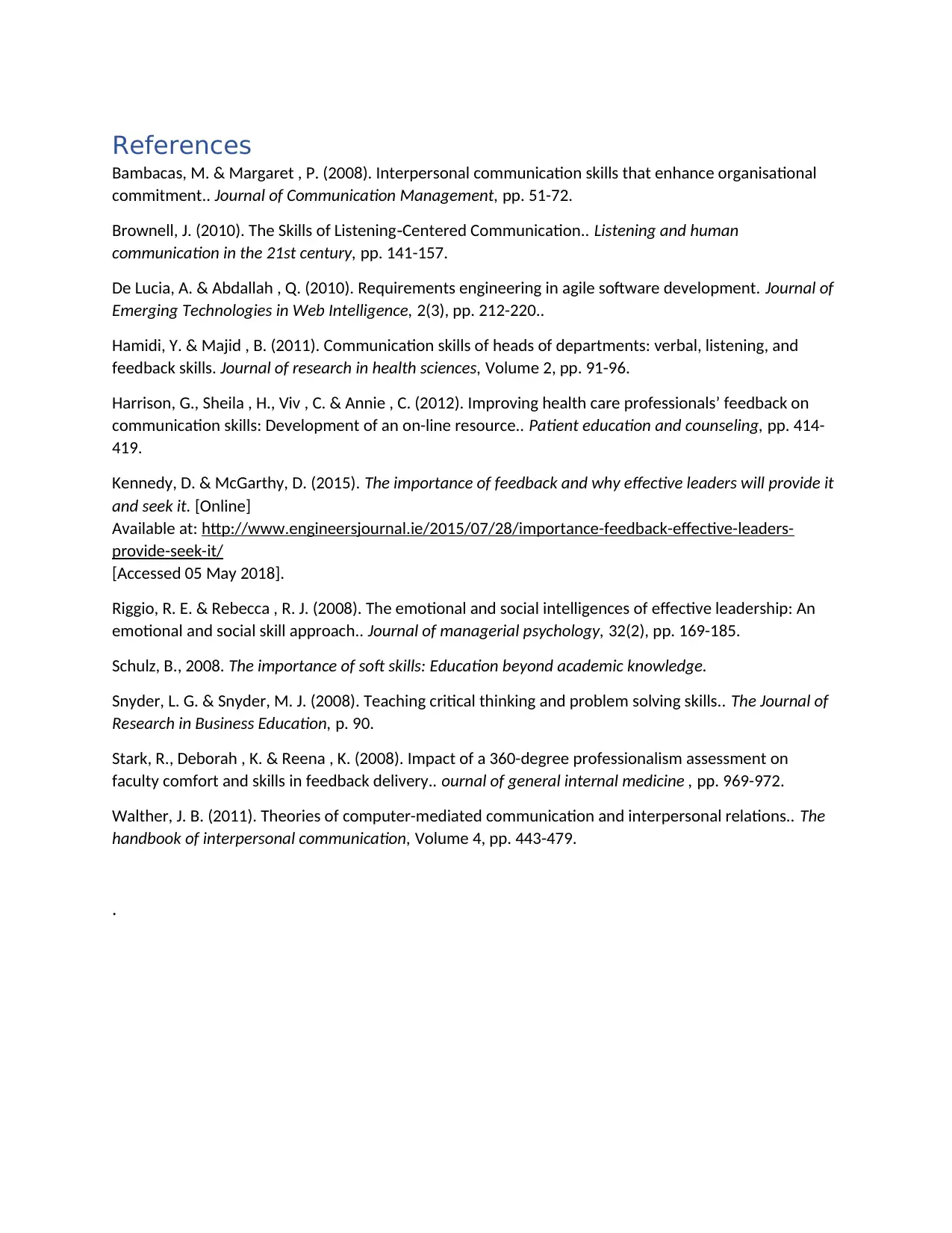
References
Bambacas, M. & Margaret , P. (2008). Interpersonal communication skills that enhance organisational
commitment.. Journal of Communication Management, pp. 51-72.
Brownell, J. (2010). The Skills of Listening Centered Communication..‐ Listening and human
communication in the 21st century, pp. 141-157.
De Lucia, A. & Abdallah , Q. (2010). Requirements engineering in agile software development. Journal of
Emerging Technologies in Web Intelligence, 2(3), pp. 212-220..
Hamidi, Y. & Majid , B. (2011). Communication skills of heads of departments: verbal, listening, and
feedback skills. Journal of research in health sciences, Volume 2, pp. 91-96.
Harrison, G., Sheila , H., Viv , C. & Annie , C. (2012). Improving health care professionals’ feedback on
communication skills: Development of an on-line resource.. Patient education and counseling, pp. 414-
419.
Kennedy, D. & McGarthy, D. (2015). The importance of feedback and why effective leaders will provide it
and seek it. [Online]
Available at: http://www.engineersjournal.ie/2015/07/28/importance-feedback-effective-leaders-
provide-seek-it/
[Accessed 05 May 2018].
Riggio, R. E. & Rebecca , R. J. (2008). The emotional and social intelligences of effective leadership: An
emotional and social skill approach.. Journal of managerial psychology, 32(2), pp. 169-185.
Schulz, B., 2008. The importance of soft skills: Education beyond academic knowledge.
Snyder, L. G. & Snyder, M. J. (2008). Teaching critical thinking and problem solving skills.. The Journal of
Research in Business Education, p. 90.
Stark, R., Deborah , K. & Reena , K. (2008). Impact of a 360-degree professionalism assessment on
faculty comfort and skills in feedback delivery.. ournal of general internal medicine , pp. 969-972.
Walther, J. B. (2011). Theories of computer-mediated communication and interpersonal relations.. The
handbook of interpersonal communication, Volume 4, pp. 443-479.
.
Bambacas, M. & Margaret , P. (2008). Interpersonal communication skills that enhance organisational
commitment.. Journal of Communication Management, pp. 51-72.
Brownell, J. (2010). The Skills of Listening Centered Communication..‐ Listening and human
communication in the 21st century, pp. 141-157.
De Lucia, A. & Abdallah , Q. (2010). Requirements engineering in agile software development. Journal of
Emerging Technologies in Web Intelligence, 2(3), pp. 212-220..
Hamidi, Y. & Majid , B. (2011). Communication skills of heads of departments: verbal, listening, and
feedback skills. Journal of research in health sciences, Volume 2, pp. 91-96.
Harrison, G., Sheila , H., Viv , C. & Annie , C. (2012). Improving health care professionals’ feedback on
communication skills: Development of an on-line resource.. Patient education and counseling, pp. 414-
419.
Kennedy, D. & McGarthy, D. (2015). The importance of feedback and why effective leaders will provide it
and seek it. [Online]
Available at: http://www.engineersjournal.ie/2015/07/28/importance-feedback-effective-leaders-
provide-seek-it/
[Accessed 05 May 2018].
Riggio, R. E. & Rebecca , R. J. (2008). The emotional and social intelligences of effective leadership: An
emotional and social skill approach.. Journal of managerial psychology, 32(2), pp. 169-185.
Schulz, B., 2008. The importance of soft skills: Education beyond academic knowledge.
Snyder, L. G. & Snyder, M. J. (2008). Teaching critical thinking and problem solving skills.. The Journal of
Research in Business Education, p. 90.
Stark, R., Deborah , K. & Reena , K. (2008). Impact of a 360-degree professionalism assessment on
faculty comfort and skills in feedback delivery.. ournal of general internal medicine , pp. 969-972.
Walther, J. B. (2011). Theories of computer-mediated communication and interpersonal relations.. The
handbook of interpersonal communication, Volume 4, pp. 443-479.
.
1 out of 7
Related Documents
Your All-in-One AI-Powered Toolkit for Academic Success.
+13062052269
info@desklib.com
Available 24*7 on WhatsApp / Email
![[object Object]](/_next/static/media/star-bottom.7253800d.svg)
Unlock your academic potential
Copyright © 2020–2026 A2Z Services. All Rights Reserved. Developed and managed by ZUCOL.





